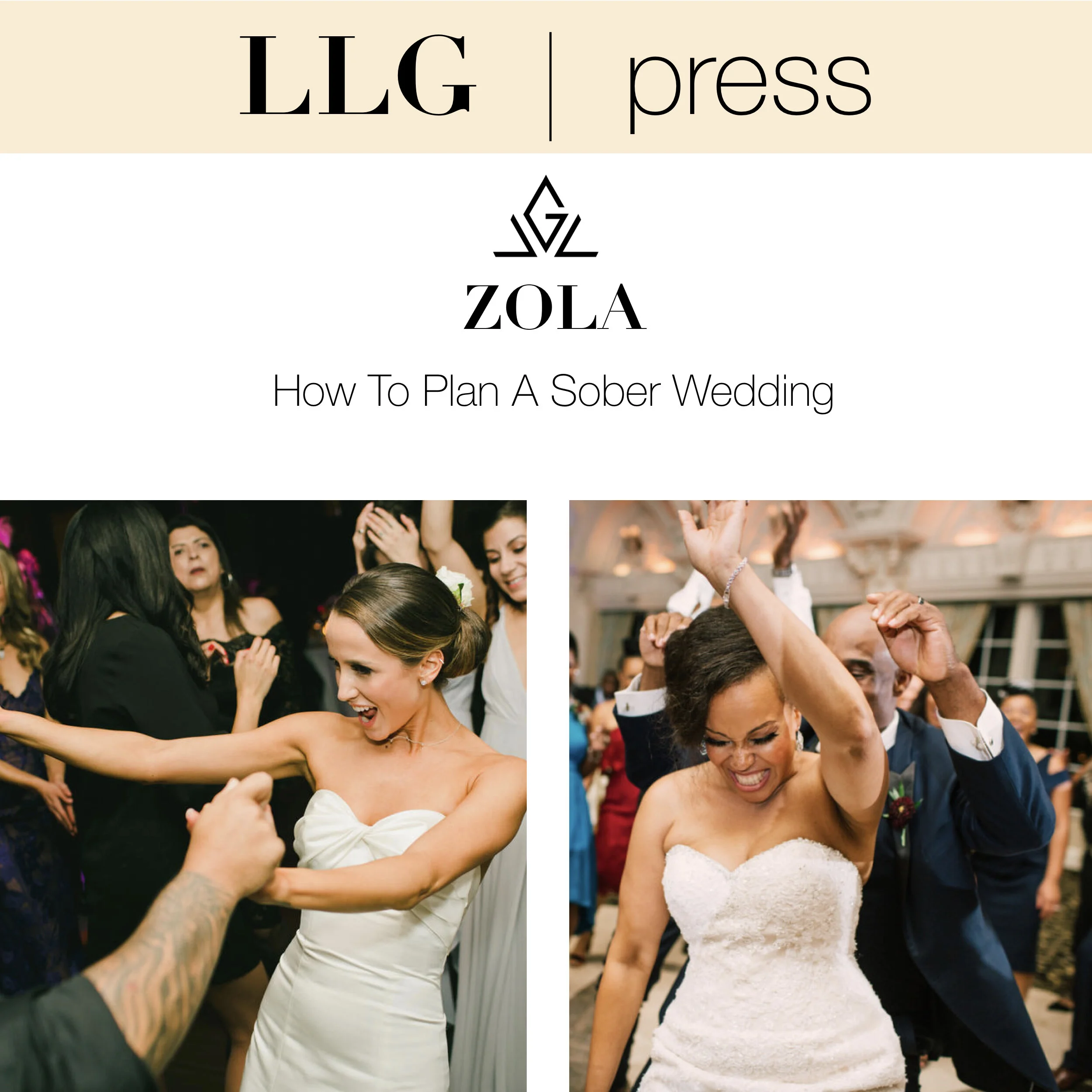How to plan a Sober Wedding
Alcohol is often part of weddings—but it doesn’t have to be. Maybe you and your partner are in recovery, don’t drink for religious or personal reasons, or simply want to have a booze-free affair. Open bars are expensive, after all. Whatever your reason, know it’s perfectly OK to have a sober wedding.
That said, there are a few things to consider when planning a sober party (of any kind, honestly). So, we spoke to expert wedding planners and got their advice on how to go booze-free on your big day. Here are some easy tips on how to plan a sober wedding.
Let guests know early on.
Some guests choose to stay sober at weddings regardless of whether or not alcohol is available. Still, if alcohol won’t be served at your celebration at all, you should let everyone know.
Jessica Lisi, a Toronto-based wedding planner, says couples should tell guests on their wedding invitation and/or through their wedding website that the event will be dry. You don’t need to offer an explanation for your decision, and if people probe, you can tell them as much or as little as you’d like. It’s your day, and you are calling the shots (or lack thereof).
“On the opposite side, if you’re a guest and would like the couple to know you require alcohol-free [drinks] for religious or personal reasons, this should be documented when your RSVP,” Lisi adds.
Consider your venue and timing.
If you want a totally alcohol-free wedding, consider a location where alcohol isn’t permitted, or you need a special permit to serve it. These can include public spaces like parks, beaches, or gardens. Some religious weddings may be hosted at venues that don’t allow alcohol either.
Also, think about timing. If you want a dry wedding, you may be inclined to have a morning ceremony and brunch or lunchtime reception. Guests are less likely to notice a lack of booze in the day than in the evening, and would happily reach for coffee over a cocktail at 11 a.m.
Weekday or Sunday ceremonies are also great options for sober weddings as folks are not as inclined to want to get wild when they have work the next day.
Encourage people to party in other ways.
Let’s face it: Alcohol loosens people’s inhibitions and acts as a social lubricant. After guests have a few cocktails, the dance floor seems to go from empty to crowded. But partying doesn’t need to equal alcohol, Lisi says.
Hire great entertainment. The wedding planner points out that if you have a fantastic band or DJ, guests will always get in the mood to move.
Break the ice. If you’re worried people will be socially anxious or uncomfortable, put some icebreaker games on tables so guests can get to know each other in between courses. You may also want to have games after dinner or play trivia.
Incorporate customs. Depending on your culture or religious background, there are also traditions that get people laughing and moving, too. Cultural dances, songs, or customs can foster interaction.
Set up stations. Lastly, you may want to think about fun things like photo booths or other pop-up activations throughout the night. These can include raffles, a pool or foosball table, or even carnival-style games.
Incorporate alcohol substitutes.
If you’re having a dry wedding, create a non-alcoholic signature drink for cocktail hour. A super tasty beverage will please guests’ tastebuds with or without booze. You can also have a list of booze-free drinks clearly listed at the bar for guests to choose from throughout dinner, too.
Infuse water. Lauren Grech, the co-founder and CEO of New York-based LLG Events, says infused water stations are also a great way to keep guests hydrated while looking elegant. She says couples can offer sparkling water or juice in place of champagne so guests always have something to toast with.
Make up with mocktails. Don’t underestimate the power of mocktails, either. Almost any alcoholic drink can be made booze-free, Grech says, including summertime classics like Pina Coladas and Sex on the Beach. If you’re having a daytime wedding, high tea or fancy espresso-based drinks are great choices.
Think of your theme. The options are really endless: You can do a kombucha station, a cold-pressed juice bar, or even a hot chocolate station in the winter. At one event Grech planned in Bora Bora, she helped a couple set-up a smoothie bar. Don’t be afraid to get creative!
Limited alcohol options.
If you want guests to have the option of drinking at your wedding should they desire, there are several ways to make that happen. A mostly or partially sober wedding may be a happy middle ground between your desires’ and your guests’.
Keep it to cash. If finances are the main reason you want to stay clear of booze, you can have a cash-bar or allow guests to bring their own alcohol. If that’s the route you want to take, it’s good form to let guests know early on. Make this clear on your wedding website and on invites.
Limit the supply. If you don’t want to go totally alcohol-free but still want to rein in the drinking, you can limit the amount of alcohol that is being served, Grech says. “Anytime that a couple is worried about their guests drinking too much, we say just serve champagne or wine during cocktail hour and then start serving hard liquor after dinner,” she says.
Consider your bar times. Lisi says another option is to have an open bar during cocktail hour, then shut the down bar entirely during dinner. She suggests having a cash bar then available during the after-party. “This way, your guests will have had some alcohol during cocktails but will have had food afterward, and then it’s up to them if they’d like to purchase more alcohol or not,” Lisi says.
At the end of the day, both Lisi and Grech stress that you need to do what’s right for you and your partner. Don’t feel pressured to serve alcohol if you don’t want to, and don’t worry about what others will think. Booze or no booze, your wedding is meant to reflect your desires, and it’s a day you’ll want to remember forever.
View the full feature on Zola

